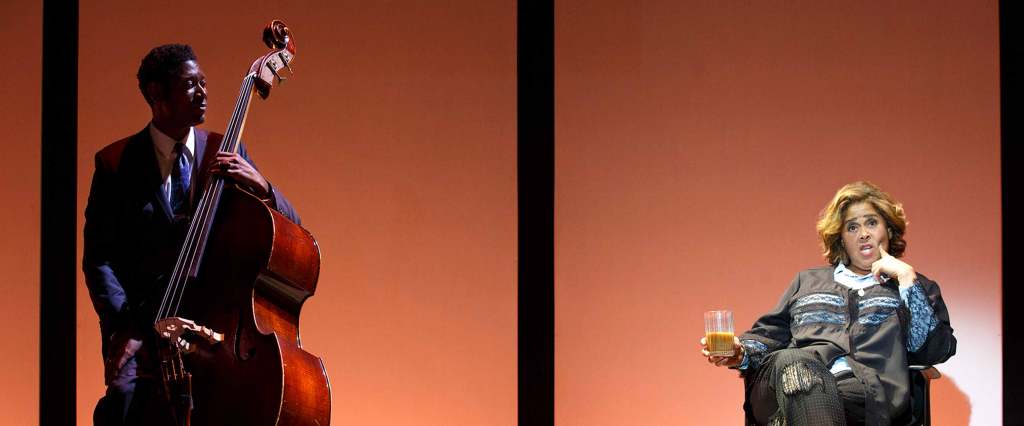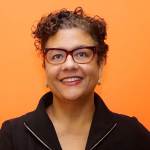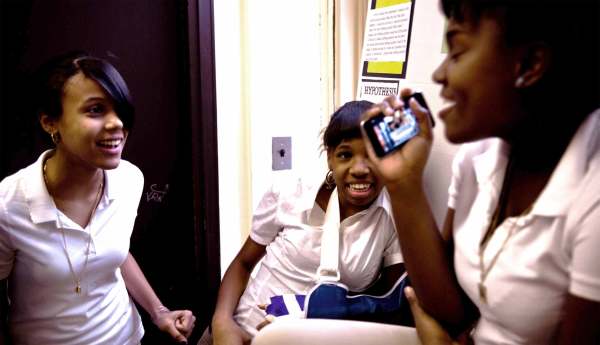
To create her latest work for the stage, Notes from the Field: Doing Time in Education, the acclaimed actress and playwright Anna Deavere Smith conducted over 250 interviews with students, teachers, members of the judiciary, criminal justice employees, activists, and others around the US and the world. The play weaves those interviews together, with Smith portraying dozens of characters herself, to shine a light on the experiences of young people living in poverty. Without adequate resources and support systems, these young people are increasingly pushed out of school and into the criminal justice system. In a series of monologues, Smith examines the “school-to-prison pipeline” by artfully drawing connections between the voices of these young people and those of adults who work in public education and criminal justice, mental health, and the civil rights movement.
Following a recent performance, Elizabeth Alexander, director of Ford’s Creativity and Free Expression program, sat down with Smith for a conversation that explored race, creativity, and empathy. Following are edited excerpts from that conversation.
Elizabeth Alexander: It’s my second time seeing this show, and I’m thinking and feeling a lot of things. One thing I was thinking a lot about is how much incredible vulnerability we see in these black bodies on the line—starting with Freddie Gray and ending with John Lewis. That seemed like a very, very powerful loop to me.
Anna Deavere Smith: It was not a deliberate thing I had in mind when I was designing the play, but that’s really interesting for me to think about. What is the difference between making the choice to put your body on the line and having your body put on the line in spite of you? It’s really about courage, and I don’t know if we think a lot about the courage of the people who are true victims of the police.
Another theme that comes across is dignity, and how we need to treat children like they’re humans.
I think the character of Sherrilyn Ifill, director of the NAACP Legal Defense Fund, becomes the brains of the play when she explains why we need to invest in people, to give them an opportunity for a future. It always strikes me as I’m saying that line: Give people an opportunity to be people.
And Bree Newsome [the filmmaker and activist from North Carolina] reminds us when to be considered a full human being under the law was to be a white male landowner; that’s what made you worthy of having a vote, and anybody else was a lesser form of human.
You start the play in Baltimore, where you are from and where your mother was an educator. Then there’s movement into California, Philadelphia, and South Carolina. But Baltimore is what roots the play. Is that where you began working on the play?
The work really began on an Indian reservation in Northern California, where the poverty was profound and there was drug and alcohol addiction but no psychiatric treatment of any kind. That was a life-changing experience for me. Then the next winter we went to Philly. I was invited to consider Baltimore as a site by the then managing director of Center Stage Theatre, Stephen Richard. Thanks to the help of the Open Society’s Baltimore branch, which had enthusiasm about the project, I agreed. My research team and I ended up in Baltimore right after the riots erupted following Freddie Gray’s funeral.
But the thing that first sparked my interest in all of this was hearing a story about a kid who peed in a water cooler in Baltimore and was going to be arrested. I was on Nurse Jackie at the time. I had created the character of Mrs. Akalitus on that show based on the sort of no-nonsense school principals I remembered in Baltimore. I felt like if a kid peed in the water cooler at my school, it wouldn’t be a very happy day for that child, but I just couldn’t imagine calling the police.
The day after I heard about it, I was in hair and makeup on Nurse Jackie with Eve Best, who played Dr. O’Hara, and I said, “You know, I can’t believe it. I just heard this story about a kid who is going to go to jail for peeing in a water cooler.” And she said, “Whatever happened to mischief?”
It all clicked. I was like, “Oh, rich kids get mischief. And poor kids get pathologized and go to jail.”
John Lewis is an amazing figure in our culture, in part because he’s been able to bear witness over such a long time, and in a way that I think only gets more complex. The monologue that you perform as him is a whole other, richer, deeper John Lewis, as he speaks of reconciliation with a law enforcement officer who beat him.
I get different reactions to that. Many people think it’s beautiful, and then there are people who say, “You’re letting your white audience off the hook.” But I don’t think that’s really the case.
If you read the “Letter from a Birmingham Jail” by Martin Luther King Jr., it’s really about love. It’s a kind of revolutionary love. It’s not like just, “Oh, everything is okay.” And John Lewis is a Christian, so this idea of forgiveness is there. I think it’s actually very courageous of John Lewis to accept the officer’s apology.
Inevitably, we are in relationship to each other. What are we going to do about that? Am I going to be aggressive and take everything you have and push you off, or is there another possibility? It doesn’t mean that you’re forgetting or excusing things, but I think forgiveness is a form of nobility.
I wrote in my piece On Grace about a young woman who was six years old during the Rwandan genocide and was unable to forgive the man who killed her whole family—because he never came to ask for forgiveness. So she said, “I’m just going to give him grace. I’m not going to hold him at my heart anymore.” There’s a kind of liberation and freedom that happens when you can take that particular oppressive feeling of being done wrong off your own heart.
I think also about the word close in this play, and about what it means to come into proximity with people. I think of the judge who says, “Closer, closer,” many times and someone else says, “Person, person, person,” many times, as though insisting. The Auden line “We must love one another or die” ultimately changes to “We must love one another and die.” I think the point is, what else is the choice? But we don’t have an answer about what it means to love each other in beloved community.
It took over 250 interviews about education in the United States before I heard somebody use the word love about students or their teaching. And then when I got to Finland they talked about it like we talk about test scores, you know? And I asked one of the Finnish educators about this: “What part does love play?” They thought I was crazy. They said, “Well, it’s essential.” They say it out loud.
Educators need a course on Love 101, and we need to reward people who can love outside of the proximity of romance and their family and their own biological child. That’s the starting point.
You and I first met many years ago, and I’ve appreciated how all of your pieces are part of a long project: part of an on-the-road search for American character. What has motivated you to pursue this journey?
When I was a child, my grandfather said, “If you say a word often enough it becomes you,” and so that’s what I’ve dedicated my adult life to. Every once in a while I’m lucky enough to get a job on television and pay the rent, but the key there is luck. I am on a journey to come in contact with and embrace that which is not me, and to experience what I haven’t lived.
In some ways, it’s an antidote and a healing measure against having been raised in de facto segregation where you’re told, “You can’t go there.” And even the people who love you say, “Don’t go over there. Don’t worry about those people.” If you buy into those particular types of survival mechanisms to protect you from the pain of racism, you’re going to lose a part of your own humanity.


